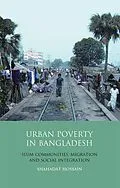The analysis of urban poverty has traditionally been dominated by economic approaches, often neglecting the social questions arising from poverty. This book seeks to redress the balance and is based on both quantitative and qualitative data collected from different slums in Dhaka City, Bangladesh. Shahadat Hossain shows that the slum communities experience the highest level of poverty and marginality in the city. They remain very much dependent on their families and social networking in their struggle to adapt to urban life. This book will be invaluable for those working in the areas of urban studies, development studies, Asian studies, sociology and social policy studies.
Autorentext
Shahadat Hossain is Assistant Professor in the Department of Sociology, University of Dhaka, Bangladesh. He received his doctorate from the University of New South Wales, Australia where he also taught sociology and anthropology.
Inhalt
Chapter 1: Introduction
Chapter 2: Overview of Dhaka City: Its Nature, Growth and Poverty
Chapter 3: Review of Urban Poverty and Slums in the Global South
Chapter 4: Toward an Integrated Theoretical Framework for Urban Poverty
Chapter 5: Neighbourhood, Demography and Households in Dhaka Slums
Chapter 6: Poverty and Vulnerability in Dhaka Slums
Chapter 7: Family, Social Networks and Organisations in Dhaka Slums
Chapter 8: Adaptations of Poor Communities to Urban Life
Chapter 9: Conclusion
